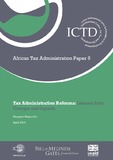| dc.contributor.author | Magumba, Margaret | |
| dc.coverage.spatial | Georgia | en |
| dc.coverage.spatial | Uganda | en |
| dc.date.accessioned | 2019-04-04T11:11:16Z | |
| dc.date.available | 2019-04-04T11:11:16Z | |
| dc.date.issued | 2019-04-04 | |
| dc.identifier.citation | Magumba, M. (2019) Tax Administration Reforms: Lessons from Georgia and Uganda, ATAP Working Paper 5, Brighton, IDS | en |
| dc.identifier.isbn | 978-1-78118-535-3 | |
| dc.identifier.uri | https://opendocs.ids.ac.uk/opendocs/handle/20.500.12413/14441 | |
| dc.description.abstract | Several tax revenue administrations have implemented significant reforms along their journeys with the aim of attaining higher tax revenue collections, improved taxpayer compliance and more efficient service delivery. The results defer from country to country depending on the nature of the reforms implemented and the circumstances surrounding them. This paper analyses and contrasts the tax reforms implemented in Georgia during its post-revolution period (after 2003) with those implemented in Uganda between 1991 and 2014. The analysis seeks to establish why Uganda’s reforms did not achieve as much success as those of Georgia even though the two countries’ reforms had much in common, and to derive key lessons from Georgia’s experience.
Whereas there are rational justifications for the difference in results attained from the two countries’ tax reforms, the paper proposes that Uganda – and other countries – can also be successful if similar principles are followed. The key lessons derived from Georgia’s experience include: (1) for tax reforms to be successful, they must be driven by both the tax administration leadership and the overriding government leadership; (2) in order to curb corruption, there must be a transformation of mindset of both tax administrators and taxpayers; (3) early success of tax reforms must be matched with visible improvement in public service delivery in order to ensure sustainability of achievements; (4) tax administrators must be empowered to perform their duties without political interference; (5) tax laws and reforms must be applied uniformly to all taxpayers; and (6) salary increments for tax administrators must be matched with an increased probability of detection of corruption and guaranteed termination of employment should a tax administrator be found guilty of corruption. | en |
| dc.language.iso | en | en |
| dc.publisher | IDS | en |
| dc.relation.ispartofseries | ATAP Working Paper;5 | |
| dc.rights.uri | http://creativecommons.org/licenses/by-nc/4.0/ | en |
| dc.subject | Finance | en |
| dc.subject | Governance | en |
| dc.title | Tax Administration Reforms: Lessons from Georgia and Uganda | en |
| dc.type | Series paper (non-IDS) | en |
| dc.rights.holder | © Institute of Development Studies 2019 | en |
| dc.identifier.team | Governance | en |
| rioxxterms.version | VoR | en |


